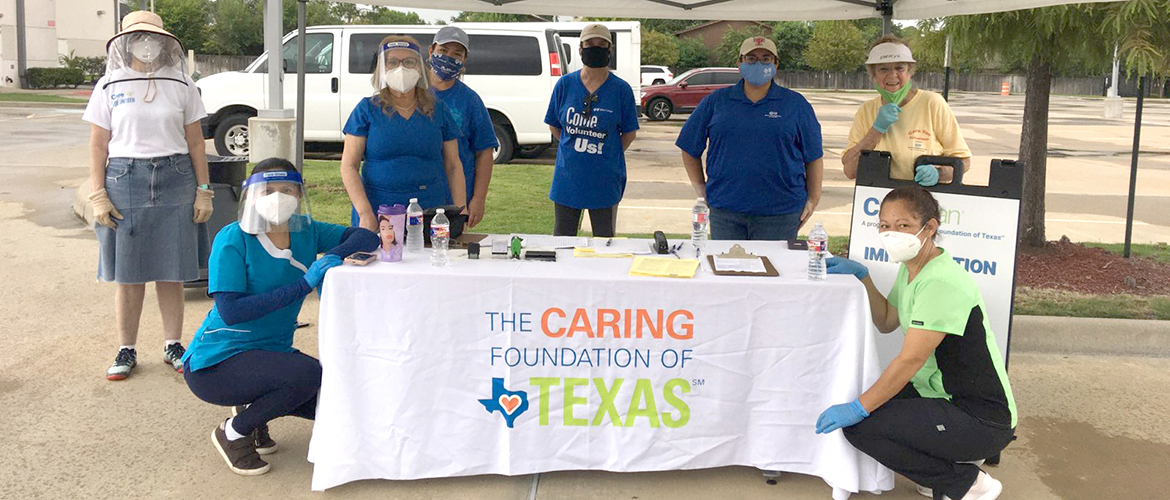The novel coronavirus has forced Ricardo Barnes to scale back efforts to help thousands of Houston-area families get their children vaccinated to enroll in school.
Before the outbreak, Barnes, executive director Spring Branch Family Development Center, held an annual, single-day immunization event where families could get free vaccinations along with backpacks full of school supplies and information about community programs and services. More than 1,000 students got immunized at the event in a typical year.
But threat of infection made such a gathering unthinkable this year. Instead, the center is offering appointment-only immunizations to limit potential coronavirus exposure.
Plunging vaccination rates caused by COVID-19 infection concerns have complicated the traditional ways community organizations, providers and public health departments push immunizations ahead of the school year. Large-scale immunization and back-to-school events have been replaced by appointment-only and drive-through vaccination clinics to ensure safety, while protecting children from potentially dangerous diseases other than COVID-19.
“Keeping up with vaccines is paramount to prevent one crisis from causing another,” says Dr. Stephanie Vomvouras, vice president and chief medical officer of quality and accreditation for Health Care Service Corporation. “It could lead to an epidemic on top of a pandemic.”
“Keeping up with vaccines is paramount to prevent one crisis from causing another."
Barnes, who started holding back-to-school immunization events 15 years ago, understands the importance of vaccinations. He’s concerned fewer children will get vaccinated at the Spring Branch center this year because his clinic can’t schedule enough appointments for all the students who are in need.
“We’ve gone from providing immunization services to thousands of kids to a fraction of that to minimize face-to-face contact,” Barnes says.
Spring Branch Family Development Center’s immunization program is one of several in statewide supported by the Caring Foundation of TexasSM and its Care Van® program.
“We have implemented a lot of new protocols, including requiring appointments to limit the number of families inside our clinics at one time and to allow for social distancing,” says Christine Kutnick, the chief operations officer for the Caring Foundation, which is sponsored by HCSC's plan in Texas.
The foundation also allows the vans to be used for drive-through immunization clinics. HCSC's plans in Illinois, Montana, New Mexico and Oklahoma sponsor similar programs that are working with community partners to help kids get immunized.
In Montana, the vans were taken off the road because of the pandemic, so the program has been providing financial support and supplies until they're able to resume.
One of those partners is the Lewis & Clark Public Health clinic, which is offering vaccinations three days week. The Helena clinic requires health screenings and temperature checks before children and parents are led to a vaccination area that's cleaned and disinfected after each appointment.
“Ensuring that immunization rates stay up during the pandemic has been a priority for not only the Care Van, but our partners across the state,” says Kamille Kirchberg, Care Van program coordinator.
In 2019, the programs helped deliver more than 70,000 vaccinations across HCSC's five states.
Immunizations drop worldwide
Health care experts are concerned that a drop in vaccinations rates could cause other disease outbreaks.
Office visits for immunizations among members of HCSC's plans in Illinois, Montana, New Mexico, Oklahoma and Texas declined 40% between March and May compared with the same period in 2019.
Parents nationwide have canceled pediatric checkups, and immunization levels for vaccine-preventable diseases have plummeted, according to the National Foundation for Infectious Diseases. Well-child office visits have decreased 50%, and doses distributed through the federally funded Vaccines for Children program have dropped significantly.
The World Health Organization (WHO) and UNICEF have reported a decline in the number of children receiving life-saving vaccines around the world.
“Vaccines are one of the most powerful tools in the history of public health, and more children are now being immunized than ever before,” says Dr. Tedros Adhanom Ghebreyesus, WHO director-general. “But the pandemic has put those gains at risk. The avoidable suffering and death caused by children missing out on routine immunizations could be far greater than COVID-19 itself.”
Recognizing the urgency, HCSC teams are working on tools and pilot programs that eventually could help its medical directors identify opportunities to increase member immunization rates. Data scientists from HCSC's Quality Innovation Institute have developed a county-by-county mapping tool, breaking down numbers, including membership, plan types and primary care physician selections, as well as vaccination rates and demographic information.
“This (mapping) tool will help us find opportunities to implement initiatives,” says senior data analysis director Dimitrina Dimitrova.
The company's health innovation platform incubator team is launching a pilot that will focus on pregnant women and mothers of infants and children up to age two. The team will test immunization approaches with these families to develop methods that meet their needs.
Success amid disruption
As coronavirus infections spread across Texas this summer, Zela Daniel, health outreach coordinator for the Garland Independent School District, grew concerned that parents in her Dallas-area school district would be reluctant to get their children immunized. The district’s immunization program is supported by the Caring Foundation.
In preparation, she implemented a strict, appointment-only immunization clinic to keep children safe and allay parents’ fears. To Daniel’s relief, most parents have scheduled immunization appointments for their children.
“I have been shocked how receptive they’ve been and how well they are following instructions,” she says. “My earlier fears have been dispelled.”

